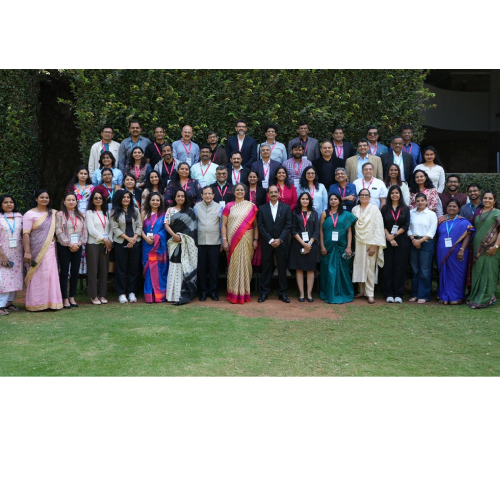
HR Conclave and World Café on the New Age Manager
Building on this momentum, the HR Conclave and World Café on the New Age Manager was hosted at IIM Bangalore on 20th February 2026, bringing together industry leaders, faculty, and HR professionals for a dynamic half-day dialogue on the evolving nature of managerial roles. The event kicked off with an opening address by Sitaraman Shankar, CEO, IIMBx, who underscored the urgency of reimagining early-career pathways and leadership readiness. A strategic insights session by Dr. G. Shainesh explored shifting market expectations and digital transformation, followed by the keynote by Dr. Vasanthi Srinivasan that used an interactive Mentimeter flow to surface participant reflections on changing capabilities and the pressures new managers face. The highlight was the World of Work Café, where rotating discussions across large enterprises, scaling ventures and founder-led MSMEs enabled candid exchanges on roles, competencies and developmental needs, including what technology can enhance and what remains uniquely human. The conclave concluded with the session led by Dr. Gopal Mahapatra, Chairperson and faculty of the Organizational Behavior & Human Resources Management area of IIMB, on ‘The New Age Manager’ and closing remarks that reinforced the need to invest not only in skills, but also in judgement, resilience and ethical grounding. The event successfully created a reflective yet forward-looking space for HR leaders to rethink capability building for the next generation of managers.
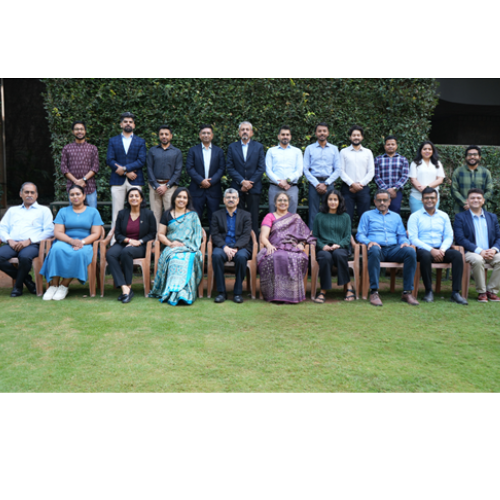
Professional Certificate in Airlines Management
The ‘Professional Certificate in Airlines Management’ continues to build strong momentum, with participants progressing steadily through the programme journey. Having completed the first three of the nine courses, the cohort is currently engaged with the fourth course, strengthening management fundamentals in the context of aviation and service-led businesses. A milestone of this learning experience was the full-day in-campus immersion held at IIM Bangalore on 19th January 2026. Designed to complement the online format with high-touch faculty engagement and peer learning, the session saw 20 participants attending in person, while about 15 participants joined live via Zoom, ensuring strong participation across locations.
The day featured four faculty-led sessions, each offering a distinct lens on leadership and decision making in complex service environments. Prof. Pavan Soni opened with ‘Design Thinking for Long Term Success’, encouraging a human-centred approach to problem solving, innovation and value creation amid uncertainty. Dr. Subhashish Gupta of the Economics area of IIMB followed with ‘Decoding Managerial Economics’, grounding participants in economic reasoning and decision tools relevant to pricing, demand, competition and resource allocation, linking core concepts to real managerial choices. Dr. Vasanthi Srinivasan, Dean, Alumni Relations & Development and faculty of the Organizational Behavior & Human Resources Management area of IIMB, then led ‘Organizational Behavior for a Sustainable Future’, focusing on culture, motivation and responsible leadership, reinforcing the importance of resilient teams and value-driven organizations in safety- and service-critical sectors. The day concluded with ‘Understanding Services Marketing’ by Dr. G. Shainesh, Chairperson of Digital Learning and Initiatives on Consumer Insights, and faculty of the Marketing area of IIMB, offering insights into customer experience, service design and relationship building, highlighting how service excellence depends on trust, consistency and frontline capability.

Two-day bootcamp for Velocity – Kotak BizLabs Accelerator Programme participants at NSRCEL
NSRCEL recently kicked off the new cohort of Velocity – Kotak BizLabs Accelerator Programme, an initiative by Kotak Mahindra Bank in partnership with NSRCEL, with a two-day bootcamp that brought together 26 tech start-ups from diverse sectors including edtech, healthtech, deeptech, inclusive tech, etc.
On Day 1, founders participated in high-impact sessions including ‘Leadership at 26,000 ft’ by Capt. Raghu Raman, Leadership Advisor, Ex-Armed Forces, Former Founding CEO, NATGRID (GoI), focused on leadership under pressure, decision-making and accountability. This was followed by a session on, ‘Founder Decision Lab’, by Nitesh Shende, Startup Coach & Investor, Ex Porter and Flipkart. Through peer conversations and structured reflection, founders exchanged perspectives and gained clarity on next steps.
Day 2 focused on growth journeys and scaling readiness. ‘Getting to PMF & Beyond’ by Kaustubh Patekar, Founder, ProdZen and Product Head, Biome, and Milind S, PM Consultant, ProdZen, unpacked practical approaches to achieving product-market fit and sustaining momentum beyond it. Parallely, Sachin Kotangale, Co-founder, AlphaByteAI, conducted an open house founder conversation on organization structuring, running pilots, experiments and building customer feedback loop.
Founders also engaged in a closed-door AMA with Gokul N A, Founder, CynLr, allowing for candid discussions around founder challenges and scaling realities. The day concluded with an open house by Gowri Shankar Nagarajan, VC, Antler India, focusing on fundraising readiness, building strong tech moats, US go-to-market strategies, and enterprise adoption pathways.
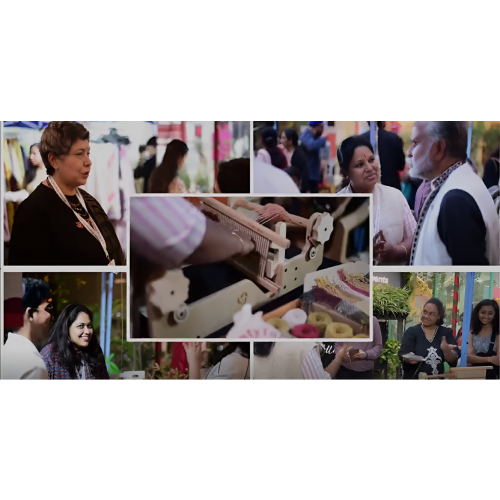
Indian Craft Collective hosted by NSRCEL highlights market potential of India’s craft-led enterprises
NSRCEL hosted the Indian Craft Collective, as part of its Women Startup Program – a CSR initiative by Kotak Mahindra Bank.
The day began with an ecosystem roundtable, bringing together policymakers, designers, retailers, donors, market access partners and founders to reflect on what it takes for art and craft ventures to scale – across markets, capital, design and policy.
The conversations flowed into the Indian Craft Collective exhibition, where 20 women-led ventures showcased contemporary expressions of Indian art and craft. Across thoughtfully curated stalls spanning handicraft, handcrafted fashion, handloom and textiles, home décor and lifestyle, jewellery, accessories and embroidery – the insights from the room came alive on the ground.
Together, the roundtable and exhibition reflected the depth, diversity and growing market potential of India’s craft-led enterprises – placing women founders at the centre of the ecosystem.

FinTech Centre of Excellence at NSRCEL hosts Demo Day
NSRCEL hosted Demo Day, as part of the FinTech Centre of Excellence – an initiative by the Government of Karnataka in partnership with NSRCEL, which brought together 17 fintech start-ups and over 18 VCs, angel networks and corporate venture teams for a day packed with conversations that matter.
With more than 90 curated one-on-one investor meetings, founders pitched, investors explored and new possibilities started taking shape.
The conversations led to networking opportunities, creating space for deeper discussions and new partnerships.

NSRCEL’s impact and effective mentoring: Annual Mentor Meetup
This year’s Annual Mentor Meetup at NSRCEL welcomed more than 60 mentors who continue to shape the journeys of countless start-ups in the ecosystem.
The day began with a welcome address by Dr. Dalhia Mani, Chairperson and faculty of the Entrepreneurship area of IIMB, setting the tone for forward-looking conversations on the path ahead. The sessions also covered NSRCEL’s impact and effective mentoring, all in great dialogue and connection. Mentors remain central to the growth-focused ecosystem that NSRCEL is building – one where entrepreneurs can thrive.
A key part of the 2026 agenda was the panel on Mentorship Across Ecosystems, featuring Raghu Dharmaraju, Balu Masti and Dr. Archana Pillai, moderated by Badri Narayanan.
NSRCEL also hosted an engaging Soap Box session led by Vinod Chandramouli, Dharmender Khanna and Rasesh Shah, exploring current and emerging market and industry trends.

NSRCEL conducts panel discussion on how AI creates measurable climate impact during India AI Impact Summit 2026
As part of the 𝗜𝗻𝗱𝗶𝗮 𝗔𝗜 𝗜𝗺𝗽𝗮𝗰𝘁 𝗦𝘂𝗺𝗺𝗶𝘁 𝟮𝟬𝟮𝟲, NSRCEL in collaboration with The Dialogue organized a panel discussion on, ‘𝗔𝗜 𝗳𝗼𝗿 𝗗𝗲𝗰𝗮𝗿𝗯𝗼𝗻𝗶𝘇𝗮𝘁𝗶𝗼𝗻 & 𝗖𝗶𝗿𝗰𝘂𝗹𝗮𝗿𝗶𝘁𝘆: 𝗕𝘂𝗶𝗹𝗱𝗶𝗻𝗴 𝗜𝗻𝗱𝗶𝗮’𝘀 𝗟𝗼𝘄-𝗖𝗮𝗿𝗯𝗼𝗻 𝗜𝗻𝗳𝗿𝗮𝘀𝘁𝗿𝘂𝗰𝘁𝘂𝗿𝗲’.
The conversation brought together leaders from policy, industry, research and investment to explore where AI is already creating measurable climate impact and what must evolve next.
The key takeaways from the session included: AI is already enabling greener manufacturing, smarter logistics, predictive maintenance and more efficient supply chains, reducing emissions and material waste. At the same time, policy frameworks such as ESG and EPR can both accelerate adoption and introduce complexity, making sector specific guidance and balanced accountability essential.

NSRCEL hosts India-France dialogue on emerging technology partnerships
NSRCEL hosted the Hon’ble French Minister for AI & Digital Affairs Anne Le Hénanff, along with a delegation of French start-ups working in AI, at Indian Institute of Management Bangalore (IIM Bangalore), during a session that brought together corporate enterprises, founders and ecosystem leaders for a focused dialogue on cross-border collaboration.
The visit featured engaging panels on AI and Quantum, along with keynotes centred on emerging technology partnerships. Conversations highlighted India’s scale, multilingual AI capabilities and public digital infrastructure alongside France’s strengths in engineering depth, sovereign frameworks and regulatory maturity, underscoring strong co-development potential.
For founders, it was a valuable opportunity to engage directly with global leaders, explore collaborations and further strengthen innovation bridges between the two ecosystems.
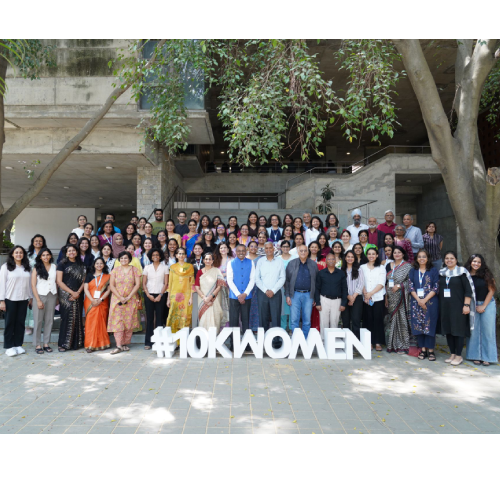
NSRCEL concludes Cohort 1 of Goldman Sachs 10,000 Women with founders presenting their business growth plans
This month, NSRCEL concluded Cohort 1 of Goldman Sachs 10,000 Women. Over the past few months, 53 ventures across 14 sectors – from FMCG and Healthcare to Agriculture, Manufacturing, Tourism, Education & Training, Financial Services, Food & Beverages, and Textile & Apparel – came together to build clarity around growth.
The cohort represented entrepreneurs from 12 states, with a strong presence from Maharashtra and Karnataka, truly reflecting a pan-India community – from Namakkal to Guwahati, and Dehradun to Hyderabad.
As part of this, founders presented their business growth plans: strategic roadmaps shaped through the program, refining direction and setting the path ahead.
The session featured Dr. Mukta Kulkarni, Dean, Programmes, Chairperson, Office of International Affairs, and faculty of the Organizational Behavior & Human Resources Management area of IIMB; Dr. Dalhia Mani, Chairperson and faculty of the Entrepreneurship area of IIMB; Jade Pais, Office of Corporate Engagement – Executive Office, Goldman Sachs, and Anjana Mariam George, Senior Consultant, Sattva Consulting.
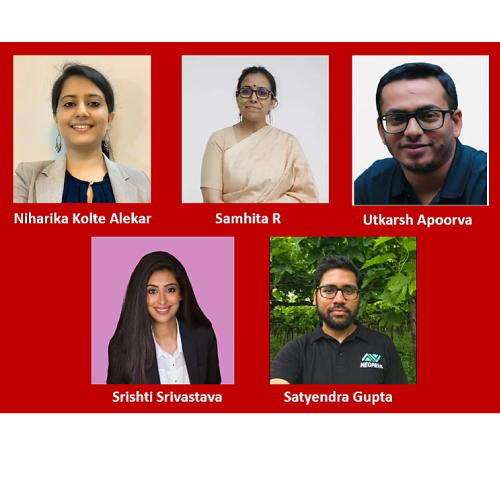
Start-ups of NSRCEL win big at AI Impact Summit 2026
- Niharika Kolte Alekar, Founder, Volar Alta, from the Women Startup Program, Goldman Sachs 10,000 Women and the Sustainable Mobility Incubation Program
- Samhita R, Founder, Resilience AI, from the Sustainable Mobility Incubation Program
- Utkarsh Apoorva, Founder, AbleCredit, from the Fintech Centre of Excellence
- Srishti Srivastava, Founder, Infiheal, from the Women Startup Program
- Satyendra Gupta, Founder, Neoperk Technologies, from the Indian Innovation Challenge Design Contest (IICDC)
Their work contributes to sustainable impact through AI-driven innovation by building solutions that truly move the world forward.
